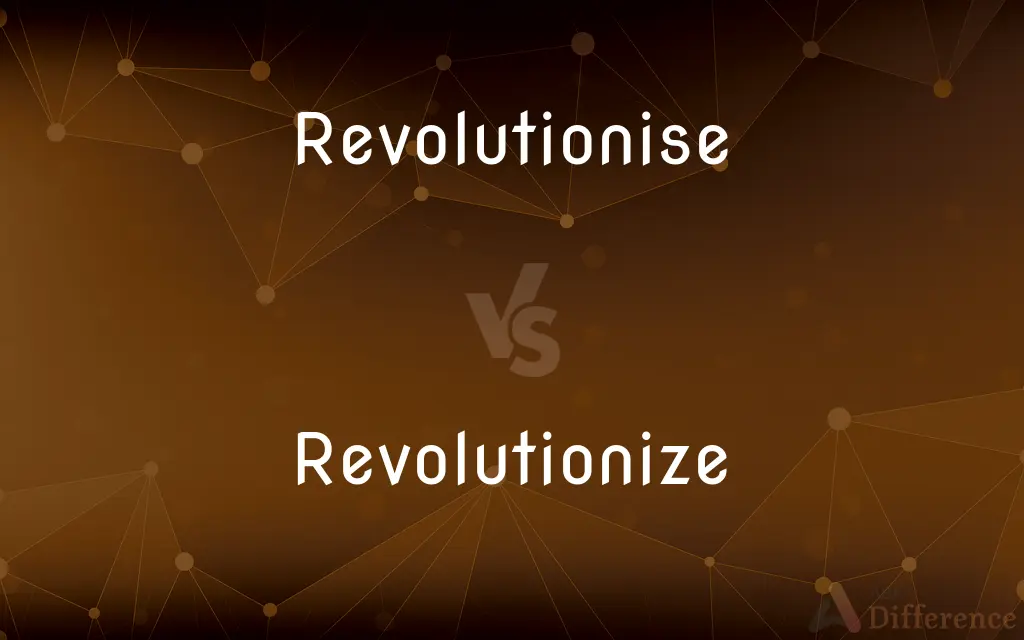Revolutionise vs. Revolutionize — What's the Difference?
By Tayyaba Rehman & Fiza Rafique — Updated on March 3, 2024
Revolutionise (BrE) and revolutionize (AmE) differ primarily in spelling, reflecting British and American English usage respectively, but both mean to fundamentally change something.

Difference Between Revolutionise and Revolutionize
Table of Contents
ADVERTISEMENT
Key Differences
Revolutionise, as used in British English, implies causing a dramatic change in a system, idea, or technology. This term is often associated with transformative changes that significantly alter the status quo. On the other hand, revolutionize, the American English spelling, carries the same meaning, emphasizing the impact of radical or groundbreaking changes in various fields such as technology, industry, or social practices.
While revolutionise might appear in British publications, educational materials, and formal documents, reflecting the spelling conventions of British English, revolutionize is predominantly used in American books, media, and conversations. This difference in spelling mirrors the broader divergence in language conventions between the UK and the US.
The choice between revolutionise and revolutionize can also signal the intended audience or cultural context of a piece of writing. Using one over the other might align with the writer's or publisher's preference for British or American English standards, thereby catering to a specific demographic.
In terms of pronunciation, the two words are virtually identical, with slight variations in accent or emphasis reflecting the speaker's dialect. These phonetic similarities underscore the fact that the primary distinction lies in orthography rather than in speech.
Despite the spelling differences, both terms encapsulate the concept of inducing radical change or innovation, whether it be in societal structures, technological advancements, or ways of thinking. The essence and impact of what it means to revolutionise or revolutionize remain consistent across English-speaking contexts.
ADVERTISEMENT
Comparison Chart
Spelling
Revolutionise
Revolutionize
Usage
Predominantly in British English contexts
Predominantly in American English contexts
Pronunciation
Similar, with minor variations based on accent
Similar, with minor variations based on accent
Cultural Alignment
Aligns with British spelling and grammar conventions
Aligns with American spelling and grammar conventions
Impact on Language
Reflects broader British English conventions in spelling and usage
Reflects broader American English conventions in spelling and usage
Compare with Definitions
Revolutionise
To completely change the way something is done, thought about, or made.
The internet has revolutionised communication.
Revolutionize
To fundamentally alter the structure or nature of something.
E-commerce has revolutionized retail shopping.
Revolutionise
To transform an existing structure fundamentally.
The industrial revolution revolutionised manufacturing processes.
Revolutionize
To cause a radical change in something, making it significantly different.
Social media has revolutionized global communication.
Revolutionise
To cause a dramatic shift in perspective or operation.
Mobile banking has revolutionised the financial industry.
Revolutionize
To alter fundamentally the way something is perceived or operated.
Electric cars are revolutionizing the automotive industry.
Revolutionise
To bring about radical innovation in a practice.
Online streaming services have revolutionised the way we watch TV.
Revolutionize
To induce transformative changes in practices or technologies.
Digital downloads have revolutionized the music industry.
Revolutionise
To introduce groundbreaking changes to a system.
His theories revolutionised the field of physics.
Revolutionize
To bring about significant innovation within a field.
His research has revolutionized modern medicine.
Revolutionise
To change radically or significantly, as in a revolution.
Revolutionize
Change (something) radically or fundamentally
This fabulous new theory will revolutionize the whole of science
Revolutionise
Fill with revolutionary ideas
Revolutionize
To bring about a radical change in
Television has revolutionized news coverage.
Revolutionise
Change radically;
E-mail revolutionized communication in academe
Revolutionize
To radically or significantly change, as in a revolution
Revolutionize
Change radically;
E-mail revolutionized communication in academe
Revolutionize
Overthrow by a revolution, of governments
Revolutionize
Fill with revolutionary ideas
Common Curiosities
Is revolutionise only related to technology?
No, it can relate to any field or practice, including social structures, industries, and methodologies.
How does revolutionise affect technology?
It implies introducing groundbreaking changes that significantly alter technological landscapes.
What does revolutionise mean?
Revolutionise means to cause a dramatic and fundamental change in the way something is done, thought about, or made.
What is the difference between revolutionise and revolutionize?
The difference is primarily in spelling, with "revolutionise" being British English and "revolutionize" being American English.
Can both revolutionise and revolutionize be used interchangeably?
Yes, they can be used interchangeably, depending on the audience's preference for British or American English.
Why do British and American English have different spellings for revolutionise/revolutionize?
The differences arise from historical spelling conventions and standardization processes in the UK and the US.
Can individuals revolutionise an industry, or is it a collective effort?
Both individuals and collective efforts can revolutionise an industry through innovative ideas and implementations.
Does the choice between revolutionise and revolutionize affect comprehension?
Generally, no, the comprehension remains the same, as the context and meaning are consistent across spellings.
Are there any pronunciation differences between revolutionise and revolutionize?
Pronunciation differences are minimal and mostly influenced by the speaker's accent.
How can knowing the difference between revolutionise and revolutionize be useful?
It helps in tailoring writing to fit British or American English standards, depending on the target audience.
How does culture influence the process of revolutionising?
Cultural values and norms can shape the direction and acceptance of revolutionary changes.
What are some historical examples of revolutionise in action?
Examples include the Industrial Revolution's impact on manufacturing and the digital revolution's effect on communication.
What role does education play in revolutionising societies?
Education can revolutionise societies by fostering critical thinking, innovation, and societal progress.
What impact does revolutionising something have on society?
It can lead to significant social, economic, and technological advancements, improving lives and practices.
How do new inventions revolutionise existing systems?
New inventions introduce novel solutions that can drastically improve or replace existing systems.
Share Your Discovery

Previous Comparison
Descendent vs. Descendant
Next Comparison
Prudent vs. CircumspectAuthor Spotlight
Written by
Tayyaba RehmanTayyaba Rehman is a distinguished writer, currently serving as a primary contributor to askdifference.com. As a researcher in semantics and etymology, Tayyaba's passion for the complexity of languages and their distinctions has found a perfect home on the platform. Tayyaba delves into the intricacies of language, distinguishing between commonly confused words and phrases, thereby providing clarity for readers worldwide.
Co-written by
Fiza RafiqueFiza Rafique is a skilled content writer at AskDifference.com, where she meticulously refines and enhances written pieces. Drawing from her vast editorial expertise, Fiza ensures clarity, accuracy, and precision in every article. Passionate about language, she continually seeks to elevate the quality of content for readers worldwide.















































